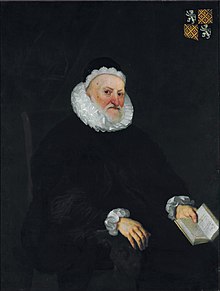Ranulph Crewe
|
The Right Honourable Ranulph Crewe |
|
|---|---|

Sir Ranulph Crewe, by Peter Lely
|
|
| Lord Chief Justice of the King's Bench | |
|
In office 1625–1626 |
|
| Preceded by | James Ley |
| Succeeded by | Nicholas Hyde |
| Personal details | |
| Born | 1558 |
| Died | 3 January 1645-6 Westminster |
| Resting place | Barthomley |
| Alma mater | Christ's College, Cambridge |
Sir Ranulph (or Randolph or Ranulphe) Crewe (or Crew) (1558 – 3 January 1646) was an English judge and Chief Justice of the King’s Bench.
Ranulph Crewe was the second son of John Crew of Nantwich, who is said to have been a tanner, by Alice, daughter of Humphrey Mainwaring. He attended Shrewsbury School and, in 1576, Christ's College, Cambridge, but did not take a degree. He was admitted a member of Lincoln's Inn on 13 November 1577, called to the bar on 8 November 1584, returned to parliament as junior member for Brackley, Northamptonshire, in 1597, elected a Bencher of Lincoln's Inn in 1600, and Autumn Reader there in 1602. The earliest reported case in which he was engaged was tried in the Queen's Bench in Hilary term 1597–8, when he acted as junior to the attorney-general, Coke. In 1604 he was selected by the House of Commons to state objections to the adoption of the new style of king of Great Britain in the conference with the lords.
His name does not appear in the official list of returns to parliament after 1597. He was certainly, however, the member for Saltash in 1614, and was elected speaker (7 April). He was knighted in June, and took the degree of serjeant-at-law in July of the following year. In the address with which, according to custom, he opened the session in 1614, he enlarged upon the length of the royal pedigree, to which he gave a fabulous extension. In January 1614–15 Crewe was appointed one of the commissioners for the examination, under torture, of Edmond Peacham. Peacham was sent down to Somersetshire to stand his trial at the assizes. Crewe prosecuted, and Peacham was convicted. His reputation was somewhat damaged by the Leicester Witch Trials, where nine women were hanged on the evidence of a young boy whom Crewe found entirely credible, but who King James soon after declared to be a fraud. Crewe was a member of the commission which tried Weston for the murder of Sir Thomas Overbury in 1615, and was concerned with Bacon and Montague in the prosecution of the Earl and Countess of Somerset as accessories before the fact in the following year. In 1621 he conducted the prosecution of Henry Yelverton, the attorney-general, for certain alleged misdemeanors in connection with patents. The same year Crewe prosecuted Sir Francis Mitchell for alleged corrupt practices in executing 'the commission concerning gold and silver thread,' conducted the impeachment of Sir John Bennet, judge of the Prerogative court, for corruption in his office, and materially contributed to the settlement of an important point in the law of impeachment. Edward Floyde, having published a libel on the Princess Palatine, was impeached by the commons, and sentenced to the pillory. The lords disputed the right of the commons to pass sentence upon the offender on two grounds : (1) that he was not a member of their house ; (2) that the offence did not touch their privileges. At the conference which followed Crewe adduced a precedent from the reign of Henry IV in support of the contention of the lords, and the commons being able to produce no counter-precedent the question was quietly settled by the commons entering in the journal a minute to the effect that the proceedings against Floyde should not become a precedent. In 1624 Crewe presented part of the case against Lionel Cranfield, earl of Middlesex, on his impeachment. The same year he was appointed king's serjeant.
...
Wikipedia
